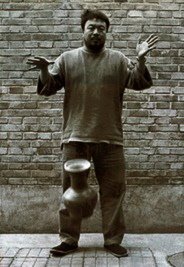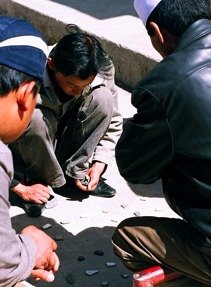This extract I first discovered some time ago but rediscovered recently, it is taken from the Confucius text Centrality and Commonality: An Essay on Chung- Yung (the Doctrine of the Mean) and has served me as a grounding, though motivating force in my fluctuating pursuit of mastering, to some degree or another, the Chinese language. I also find that it manifests nicely in the common Chinese phrase, 慢慢来 (man4 man4 lai2), which means slowly, slowly come; offering a usefully patient perspective to an otherwise achingly slow progression, whether in terms of Chinese language learning, or generally as a human being in life. (I found the extract again here on pages 73-74) ‘Study it [the way to be sincere] extensively, inquire into it accurately, think over it carefully, sift it clearly, and practice it earnestly. When there is anything not yet studied, or studied but not yet understood, do not give up. When there is any question not yet asked, or asked but its answer not yet known, do not give up. When there is anything not yet thought over, or thought over but not yet apprehended, do not give up. If another [person] succeeds by one effort, I will use a hundred efforts. If another [person] succeeds by ten efforts, I will use a thousand efforts. If one really follows this course, though stupid, he will surely become intelligent, and though weak, will surely become strong’. [XX: 19-21]
‘Study it [the way to be sincere] extensively, inquire into it accurately, think over it carefully, sift it clearly, and practice it earnestly. When there is anything not yet studied, or studied but not yet understood, do not give up. When there is any question not yet asked, or asked but its answer not yet known, do not give up. When there is anything not yet thought over, or thought over but not yet apprehended, do not give up. If another [person] succeeds by one effort, I will use a hundred efforts. If another [person] succeeds by ten efforts, I will use a thousand efforts. If one really follows this course, though stupid, he will surely become intelligent, and though weak, will surely become strong’. [XX: 19-21]
I once had a Sociology teacher that pointed out that about 90% of humans have about the same level of intelligence, but their social circumstance dictates to what degree they have utilised it. The final 10% are split into two groups, the ones who have finely honed mental capacities in one field of brain activity or another; and those that have identifiable learning difficulties.
Empirically, I do not know how accurate those statistics are, but from a general perspective of living in life and meeting a multitude of different people, it seems about right to me. Consequently, it appears a humbling and chastising fact to be aware of, a two fold issue, involving good and bad luck on the one hand and motivation and excuse on the other.
I am of course aware of the many factors that dictate to us our being, but it does seem positive to try to realize that we still can be what we make of ourselves. Sometimes, maybe, we just have to adapt the context from which we judge ourselves, not always that easy, but, as Kong3 Fu1 Zi3 (Confucius) may never have said, doable.
Tuesday, 14 April 2009
Confucius Notations and the Slow Learning of Chinese
Subscribe to:
Post Comments (Atom)












No comments:
Post a Comment